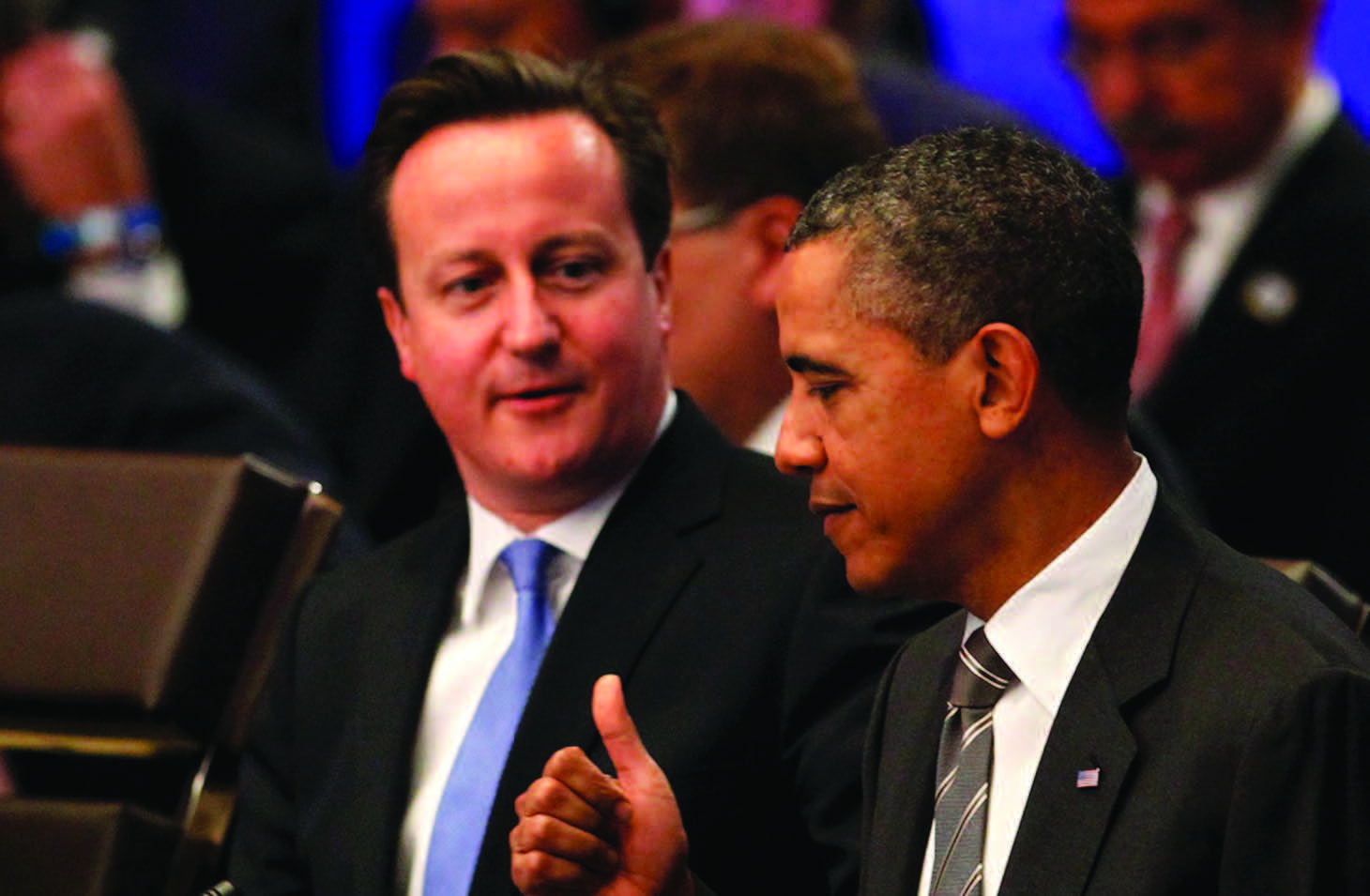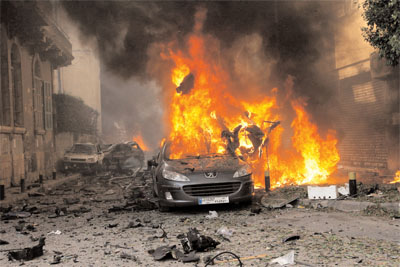
WASHINGTON/BEIRUT (TIP): The British parliament on August 29 rejected a motion supporting military action in Syria, reflecting deep divisions about using force to punish President Bashar al- Assad for what Western governments believe was his use of chemical weapons against civilians. U.S. officials conceded on August 29 that they lacked conclusive evidence that Assad personally ordered last week’s poison gas attack, and some allies have warned that military action without U.N. Security Council authorization risks making the situation worse. President Barack Obama‘s top national security officials were due to brief Congress on Syria later on Thursday, but any intervention looked set to be delayed at least until U.N. investigators report back after leaving Syria on Saturday.
The British parliament’s rejection of the largely symbolic motion proposed by Prime Minister David Cameron, which would have given authorization in principle for action subject to a second vote, was a setback for Obama’s efforts to build a coalition for action. Cameron said afterward he would not override the will of parliament and approve such action, saying it was clear that parliament did not want to see a military strike on Syria to punish it for chemical weapons use and that he would act accordingly. White House spokesman Josh Earnest suggested before the British vote that the United States might be willing to act on its own. “When the president reaches a determination about the appropriate response … and a legal justification is required to substantiate or to back up that decision, we’ll produce one on our own,” Earnest said.
Syrian opposition sources said Assad’s forces had removed several Scud missiles and dozens of launchers from a base north of Damascus, possibly to protect them from a Western attack, and Russia was reported to be moving ships into the region. But expectations of imminent turmoil eased as the diplomatic process was seen playing out into next week, and the White House emphasized that any action would be “very discrete and limited,” and in no way comparable to the Iraq war. The United States and its allies have “no smoking gun” proving Assad personally ordered the attack on a rebel-held Damascus neighbourhood in which hundreds of people were killed, U.S. national security officials said. In secret intelligence assessments and a still-unreleased report summarizing U.S. intelligence on the alleged gas attack on August 21, U.S. agencies expressed high confidence that Syrian government forces carried out the attack, and that Assad’s government therefore bears responsibility, U.S. national security officials said. Syria denies blame for the gas attacks and says they were perpetrated by rebels. Washington and its allies say the denial is not credible. Secretary of State John Kerry and Secretary of Defense Chuck Hagel were among senior U.S. officials expected to brief congressional leaders later on Thursday. Some lawmakers complained they had not been properly consulted. While U.N. chemical weapons inspectors spent a third day combing the rebel-held area where the attack took place, traffic moved normally elsewhere in Damascus, with some extra army presence but little indication of any high alert.
An extended parliamentary debate in London revealed deep misgivings stemming from the 2003 invasion of Iraq. After pressure from lawmakers, the British government – a key player in any proposed air assault on Syria – had promised parliament that even if it voted in favor, there would be a second decisive vote once the U.N. weapons inspectors report their findings. Even that motion was defeated by 285 to 272 votes. ‘MONSTROUS CRIME’ The United Nations said its team of inspectors would leave Syria on Saturday and report to Secretary-General Ban Ki-moon. France and Germany urged the world body to pass its report on to the decision-making Security Council as soon as possible “so that it can fulfil its responsibility with regards to this monstrous crime.” The United States, Britain and France say they can act with or without a U.N. Security Council resolution, which would likely be vetoed by Russia, a close ally of Assad. But some countries are more cautious: Italy said it would not join any military operation without Security Council authorization. Western diplomats say they are seeking a vote in the 15-member Council to isolate Moscow and demonstrate that other countries are behind air strikes.
A report from Moscow that Russia is sending two warships to the eastern Mediterranean underscored the complications surrounding even a limited military strike, although Russia has said it will not be drawn into military conflict. The ambassadors of the five veto-wielding permanent U.N. Security Council members appeared to have made no progress at a meeting on Thursday, a council diplomat said. The five – the United States, Russia, China, Britain and France – had held an inconclusive meeting on Wednesday to discuss a draft Security Council resolution that would authorize “all necessary force” in response to the alleged gas attack. Cameron told Britain’s parliament it would be “unthinkable” to proceed if there was overwhelming opposition in the Security Council. But he published legal advice given to the government under which military action would be lawful for humanitarian reasons even if a Security Council resolution were blocked by a veto. The International Committee of the Red Cross joined a chorus of international voices urging caution. “Further escalation will likely trigger more displacement and add to humanitarian needs, which are already immense,” said Magne Barth, head of the ICRC delegation in Syria. Increasing expectations that any action will be delayed ended a three-day selloff on world share markets on Thursday, although investors were still on edge over fears of future turmoil in the Middle East.
‘SHOT ACROSS THE BOW’ Obama sought to win over a war-weary American public on Wednesday evening by saying intervention in Syria, where more than 100,000 people have been killed in 2 1/2 years of civil war, would serve U.S. national security interests. “If we are saying in a clear and decisive but very limited way, we send a shot across the bow saying, ‘Stop doing this,’ this can have a positive impact on our national security over the long term,” he told “PBS Newshour” in a televised interview. According to the U.S. national security officials, evidence that forces loyal to Assad were responsible goes beyond the circumstantial to include electronic intercepts and some tentative scientific samples from the site. “This was not a rogue operation,” one U.S. official said. Western leaders are expected in Russia next Thursday for a meeting of the Group of 20 big economies, an event that could influence the timing of any strikes. The hosts have made clear their view that Western leaders are using human rights as a pretext to impose their will on other sovereign states. A spokesman for the main Syrian opposition umbrella group, the Syrian National Coalition, said the opposition was confident Western leaders were prepared to act.
SNC leader Ahmed Jarba met French President Francois Hollande. An SNC spokesman said they discussed a two-wave intervention to first target installations used to launch chemical weapons and then hit other government bases in Syria. “We are very happy. France and its partners are quite decided to punish the Syrian regime,” SNC envoy Monzer Makhous told Reuters after the talks. “Then there will be military aid to help the opposition to change the balance of power.” Hollande urged Jarba to create a credible military force, highlighting Western concern that the mainstream opposition is unable to control al Qaeda-linked militias on the ground in Syria. Syrian officials say the West is playing into the hands of its al Qaeda enemies. In Damascus, residents and opposition forces said Assad’s forces appeared to have evacuated most personnel from army and security command headquarters in the centre in preparation for Western military action. People unable to decide whether to leave for neighboring Lebanon said the border was already jammed. “We’re hearing people are spending hours – like 12 or 14 hours – waiting in line at the border,” said Nabil, who was considering leaving town for Beirut with his wife and young daughter, “just until the strike is over.”
Diplomats based in the Middle East told Reuters the removal of some of Assad’s Scud missiles and launchers from the foothills of the Qalamoun mountains, one of Syria’s most heavily militarized districts, appeared to be part of a precautionary but limited redeployment of armaments. Despite opinion polls showing most Americans oppose deeper involvement in the Syrian conflict, Obama has been under pressure to enforce a “red line” against chemical weapons use, which he declared just over a year ago. “I have no interest in any open-ended conflict in Syria, but we do have to make sure that when countries break international norms on weapons like chemical weapons that could threaten us, that they are held accountable,” Obama said. The likeliest option, U.S. officials say, would be to launch cruise missiles from U.S. ships in the Mediterranean in a campaign that would last days. A fifth U.S. destroyer, the USS Stout, was headed toward the coast off Syria, according to one defense official. That would bring the total of U.S. destroyers in the eastern Mediterranean to five, although the Stout is likely to relieve the USS Mahan, which had been due to return to its U.S. base but stayed in the region due to the situation in Syria. Still the decision to replace the Mahan with another destroyer means the United States will be maintaining an expanded presence in the region.





Be the first to comment